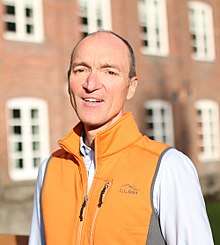Bjørn Hofmann
| Bjørn Hofmann | |
|---|---|
 Bjørn Hofmann in 2015 | |
| Born |
July 20, 1964 |
| Nationality | Norwegian |
| Occupation | Professor at the Department of Health, Technology and Society at the Norwegian University of Science and Technology |
Bjørn Morten Hofmann (born in Oslo, July 20, 1964) is a Norwegian researcher in the philosophy of medicine. Some of his main areas of interest are the relationship between epistemology and ethics, and the concepts of health, disease and overdiagnosis.
He holds appointments as professor in the Department of Health, Technology and Society at the Norwegian University of Science and Technology (NTNU) in Gjøvik and as adjunct professor in the Centre for Medical Ethics at the University of Oslo (UiO).
Education and professional career
Hofmann received most of his training at the Norwegian Institute of Technology (NTH), (later integrated into NTNU), and UiO. In 1989 he received his MSc in physical electronics and biomedical technology from NTH.
He later completed a one-year foundation course in the history of ideas at UiO (1991) and an intermediate level course in philosophy at the University of Tromsø (1994).
In 2002 he received his Dr.Philos degree from UiO for his thesis entitled The technological invention of disease: On disease, technology and values.[1]
After his studies at NTH he worked with medical technology at Lillehammer Hospital and with health applications at Telenor Research. Between 2004 and 2013 he worked as a researcher at the Norwegian Knowledge Centre for the Health Services. He has been working as a professor at the University College of Gjøvik and at the University of Oslo. When the University College of Gjøvik merged with NTNU in 2016, he became a professor at the Norwegian University of Science and Technology (NTNU).
Research
Hofmann's academic areas of interest are basic concepts of disease, health and overdiagnosis, and unnecessary examination and treatment. He has also conducted research and disseminated topics in the areas of philosophy of medicine, medical and health research ethics, biomedical ethics, and theories of technology and technology assessment.[2] He is often contacted by the media to comment on issues related to these subject areas.[3][4]
Hofmann has developed a method for assessing ethical aspects of health technology.[5][6] This method has been further developed and adapted by others.[7][8]
Together with researchers Søren Holm (UiO) and Anne I. Myhr (UiT) he conducted a study in 2010-2011 among PhD students at Norwegian medical faculties, to investigate their attitudes toward scientific dishonesty. The conclusions of the study attracted wide attention. For example, 10 per cent of the students considered it acceptable to falsify or fabricate data, and 10 per cent to report experimental data without having conducted the experiment.[9] The findings were published in BMC Medical Ethics and other journals.[10]
In 2014 Hofmann was selected as a Harkness Fellow for the period 2014–2015. The Harkness Fellowship is arranged in partnership with the Norwegian Knowledge Centre for the Health Services, Research Council of Norway, and the US-based Commonwealth Fund. During his fellowship, Hofmann conducted research into overdiagnosis, in cooperation with researchers in The Dartmouth Institute for Health Policy and Clinical Practice at Dartmouth College, New Hampshire.[11]
Publications (selection)
- List of publications by Bjørn Hofmann in BIBSYS (Norway)[12]
List of publications by Bjørn Hofmann in CRIStin (The Norwegian Scientific Index)
Twenty of his papers and journal articles have been cited 20 times or more, according to Google Scholar (2016). His most cited papers are:
- Hofmann B. "Toward a procedure for integrating moral issues in health technology assessment." International Journal of Technology Assessment in Health Care 2005;21(3):312-18.[13]
- Hofmann B. "Broadening consent and diluting ethics." Journal of Medical Ethics 2009; 35(2): 125-129.[14]
- Hofmann, B. "Is there a technological imperative in health care?" International Journal of Technology Assessment in Health Care 2002; 18(3): 675–689.[15]
References
- ↑ Dissertation in full-text version (PDF)
- ↑ Hofmann's profile page, University of Oslo
- ↑ Doseth, Karin (1. november 2010) «Skjønnhetens tyranni». I: Gudbrandsdølen Dagningen (Norwegian)
- ↑ Berg, R. og H. Kreutz-Hansen (22. juni 2013) «Pene mennesker har høyere intelligens enn stygge mennesker – spesielt hvis de er menn.» In: VG, p. 56–57 (Norwegian)
- ↑ «Toward a procedure for integrating moral issues in health technology assessment». In: International Journal of Technology Assessment in Health Care. 2005 Summer; 21(3):312-8.
- ↑ «Harmonization of ethics in health technology assessment: a revision of the Socratic approach». In: International Journal of Technology Assessment in Health Care. 2014 Jan;30(1):3-9. With S. Droste, W. Oortwijn, I. Cleemput, D. Sacchini
- ↑ Heintz, E. … (et al.). «Framework for systematic identification of ethical aspects of healthcare technologies: the SBU approach». In: International Journal of Technology Assessment in Health Care 2015 Jul 2:1-7 (e-preprint)
- ↑ Lampe, K. … (et al.) «The HTA core model: a novel method for producing and reporting health technology assessments.» In: International Journal of Technology Assessment in Health Care 2009 Dec; 25 Suppl 2:9-20
- ↑ Flem, Sofie S. (26. mai 2013) «Tar avstand fra forskningsjuks». In: Bergens Tidende (Norwegian)
- ↑ «Scientific dishonesty—a nationwide survey of doctoral students in Norway». In: BMC Medical Ethics 2013, 14:3 (full-text version)
- ↑ The Commonwealth Fund's information on Hofmann's research project
- ↑ BIBSYS' unified search service "ORIA" gives an overview of the literature held by all Norwegian college and university libraries, other research institutions and the National Library of Norway
- ↑ cited 110 times according to Google Scholar (2016)
- ↑ cited 93 times according to Google Scholar (2016)
- ↑ cited 75 times according to Google Scholar (2016)
Sources
- Bergstrøm, Ida (31. mai 2013) «Professor pipelort». In: På Høyden (Norwegian)
- Hofmann, Bjørn (2004)«Hva er sykdom?» In: Sykepleien, nr. 2 (Norwegian)
- Hofmann's profile pages at UiO and NTNU (English)
External links
- Hofmann's profile page, University of Oslo (accessed on 3 September 2015)
- Hofmann's profile page, NTNU (accessed on 17 March 2016)